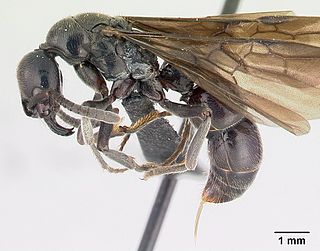
Ponerinae, the ponerine ants, is a subfamily of ants in the Poneromorph subfamilies group, with about 1,600 species in 47 extant genera, including Dinoponera gigantea - one of the world's largest species of ant. Mated workers have replaced the queen as the functional egg-layers in several species of ponerine ants. In such queenless species, the reproductive status of workers can only be determined through ovarian dissections.

Odontomachus is a genus of ants commonly called trap-jaw ants found in the tropics and subtropics throughout the world.

Aphaenogaster is a genus of myrmicine ants. About 200 species have been described, including 18 fossil species. They occur worldwide except in South America south of Colombia, sub-Saharan Africa, and Antarctica.

Tetramorium is a genus of ants in the subfamily Myrmicinae that includes more than 520 species. These ants are also known as pavement ants.

Ponera is a genus of ponerine ants. The name is the Latinized form of the Ancient Greek ponira.

Diacamma is a genus of queenless ants belonging to the subfamily Ponerinae. It is distributed from India to Australia and contains about 24 species.

Anochetus is a genus of small, carnivorous ants found in the tropics and subtropics throughout the world.

Centromyrmex is a pantropical, though mainly Afrotropical, genus of ants in the subfamily Ponerinae. This ponerine ant was recorded for the first time in French Guiana and the most northerly point of recording was in Costa Rica. The specimens reported here were collected in a region of Amazon Forest with flight interception traps.

Hypoponera is a genus of ants in the subfamily Ponerinae. The genus has a worldwide distribution and is found in all continents except Antarctica.

Cryptopone is a genus of ants in the subfamily Ponerinae. The genus has a worldwide distribution, with most species occurring in Asia. Workers range from very small to medium in size (1.7–6.1 mm), with the queens being slightly larger.

Platythyrea is a genus of predaceous ants in the subfamily Ponerinae and the sole member of the tribe Platythyreini.

Bothroponera is a genus of ants in the subfamily Ponerinae. It is distributed in Africa and Asia.

Rasopone is genus of ants in the subfamily Ponerinae. The genus is restricted to Central and South America.

Ectomomyrmex is a ponerine genus of ants found in Asia and Australia. Little is known about their biology, but they seem to be generalist predators of arthropod prey.

Euponera is a ponerine genus of ants distributed in the Afrotropics and eastern Asia. Workers are large (6–10.5 mm); queen are similar to workers, but larger and winged.

Hagensia is a small genus of ants in the subfamily Ponerinae. Its two species are known only from coastal areas in South Africa. Workers are large (10.5–13.0 mm); queens are unknown, but gamergates occurs in both species.

Neoponera is a genus of ants in the subfamily Ponerinae. Restricted to the Neotropics, the genus is found from southern Texas to southern Brazil. Workers are slender, and medium to large in size (6.5–19 mm); queens are similar to workers but larger and winged.

Pseudoneoponera is a ponerine genus of ants found from India to Australia, they are mostly non queen species, most of the species within the genus thrives on only gamergates.

Ponerini is a tribe of Ponerinae ants with 46 genera and 6 extinct genera.


















